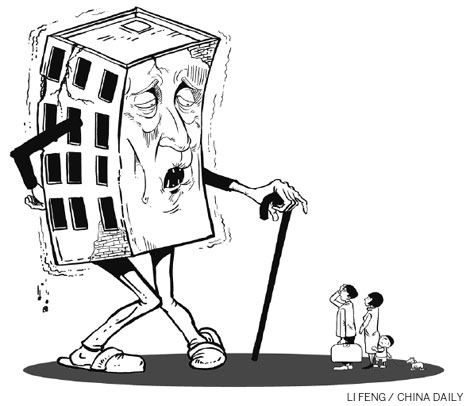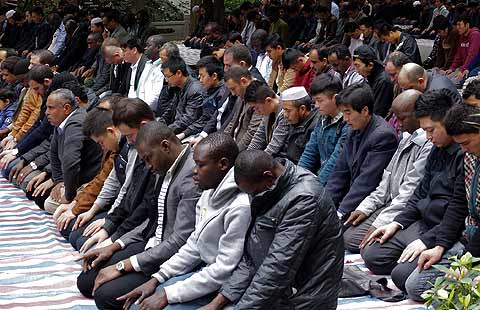Weak buildings threaten life
Updated: 2014-04-11 06:33
By Zheng Fengtian (China Daily USA)
|
|||||||||
On April 4, a building collapsed in Fenghua, Zhejiang province. Five days later, the deputy chief of construction of the street where the building once stood is said to have committed suicide.
Did the local official (He Gaobo) commit suicide because he was forced to take the blame for accident? It is not known. But if indeed that is the case then He should be seen as a victim of injustice, because grassroots-level officials should not be made scapegoats for such accidents.
The Fenghua building collapse could be the beginning of a wave of such accidents as the "fast food" buildings built in the 1980s and 1990s enter their 30s and 20s. So there is no justification in blaming grassroots officials who have neither the power nor financial resources at their command for such accidents.
On the contrary, it's high time higher-level officials looked at the real cause of such accidents and took measures to protect people's lives and properties. To begin with, quality supervision officials should establish an accountability system and regularly inspect residential buildings to identify and eliminate risks before accidents happen.
Over the past few years, the public and the media have focused attention on rising housing prices, overlooking the importance of safety that comes with the use of quality construction materials. According to the Property Law, a person enjoys property right over real estate for 70 years, but many of the residential buildings seem to have a lifespan of only 50 years, after which they would become too dangerous to live in or would be pulled down. Some experts even say that some of the buildings are good enough to last only 25 years.
This should remind authorities to take measures to ensure that property developers use only quality materials in construction. This has become all the more important because similar accidents have been reported from Shijiazhuang, Hebei province, and Shanghai earlier.
Many people say that property developers use substandard construction materials to maximize profits, and experts fear this trend will enter a high risk period in the coming two decades.
Therefore, ensuring the use of quality construction materials is key to protecting people's property rights, especially because a house is the costliest asset that a majority of the families purchase.
With urbanization gaining a feverish pace in China, quality control and safety factors have become more important than ever. Zhou Lei, a specialist with the Ministry of Housing and Urban-Rural Development, once said that quite a few property developers are using poor construction materials and cheating homebuyers in other ways. For example, some developers deviate from the standard requirement for reinforcement covers in a major way.
In fact, Zhu Minfeng, the Guangdong provincial bureau of quality supervision, even warned people not to buy apartments in buildings built in 2007 or 2008 in Guangdong because developers had grossly compromised on the quality of materials and construction.
The average lifespan of buildings in China is less than those in Japan or European countries. Buildings in Japan have a longer lifespan even though the country is often rocked by massive earthquakes. Europe is home to many "centurion" buildings, the average lifespan of buildings in the United Kingdom is 130 years. On the other hand, the average lifespan of a building in China is about 50 years, much less than that in Switzerland and Norway (80 years).
"The reason some buildings (in China) won't last more than 50 years, or in some cases about 25 years, is their faulty architectural structure and the use of low quality materials," Zhou says. So, people "should pay attention to not only the buildings that have collapsed, but also to the potential risks that other buildings hide".
Since rebars and concrete make up the "skeleton" of a building and support its weight, they should be of sound quality. And rebars need quality concrete cover to prevent corrosion. If substandard materials are used for the concrete cover, corrosion will set in earlier than expected and shorten the life of the building.
The quality issue is closely related to the rapid development of the construction industry and weak supervision. A real estate project is usually divided into three phases: design, construction and inspection for approval. Experts say quality is compromised most during the construction process. The problems, however, could be detected during the last process, that is inspection. But corruption and nepotism play a vital role in ensuring that the potential risks go either "undetected" or "unreported".
Perhaps developers are right - people should not be worried about extending their property rights beyond 70 years because many of the buildings are likely to be pulled down before their property rights expire.
The use of inferior materials in building construction is not only a safety risk for residents, but also could lead to legal tangles. With China experiencing a realty boom, it will be difficult for a homeowner (or his/her successor) to trace the original developer or construction company, that is, if it is still around after a few decades. In such cases, the family has to bear the loss if a building collapses.
Besides, many families have to mortgage their homes to meet the skyrocketing housing prices. So the collapse of a building before a homebuyer pays off his/her loan will create a peculiar situation for both the homebuyer and the bank. Why should a homebuyer pay his/her mortgage after losing his/her house? But then, why should the bank not get back its loan if a building collapses? That's why a compensation system needs to put in place to deal with such cases and minimize the loss of houseowners.
The author is deputy dean of the agricultural economics and rural development school at the Renmin University of China.

(China Daily USA 04/11/2014 page16)

 People enjoy cherry blossoms in Washington
People enjoy cherry blossoms in Washington
 Prince William, Kate unveil portrait of Queen Elizabeth
Prince William, Kate unveil portrait of Queen Elizabeth
 Hagel gets recipe of goodwill
Hagel gets recipe of goodwill
 US, China firms team up on green truck play
US, China firms team up on green truck play
 21 injured in Pennsylvania school
21 injured in Pennsylvania school
 Bakers perform with dough in pizza championships
Bakers perform with dough in pizza championships
 People enjoy cherry blossoms in Washington
People enjoy cherry blossoms in Washington
 Top 10 China archeological discoveries for 2013
Top 10 China archeological discoveries for 2013
Most Viewed
Editor's Picks

|

|

|

|

|

|
Today's Top News
Another possible signal heard in search
Sebelius resigns after Obamacare woes
Suspect claims he killed 40 as hitman
Soybean talks focus on biotech issues
US Asian carp find plates in China
US, China firms team up on green truck play
Ships sale to Taiwan 'unlikely'
Hagel gets closer to PLA
US Weekly

|

|








